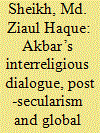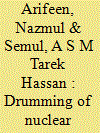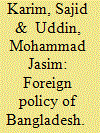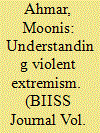|
|
|
Sort Order |
|
|
|
Items / Page
|
|
|
|
|
|
|
| Srl | Item |
| 1 |
ID:
157616


|
|
|
|
|
| Summary/Abstract |
Samuel Moyn and Andrew Sartori depict a conceptual map of a range of
possible approaches and ways in which Global Intellectual History (GIH) can
be formulated as an academic discipline. Various scholars from different fields
propose to widen its scope and boundaries - from trans-local and westerncentric
to intra-regional, trans-continental, trans-national and even beyond the
geographical designation. In this writing, an attempt has been made to bring the
idea of “Suhl-i-kul”, a state sponsored ‘interreligious-dialogue’ initiated by Akbar
(1556-1605), a mediaeval Mughal emperor of India, as a content of GIH. This
study assumes that the concept of “Suhl-i-kul” can be matched with the idea of
‘post-secularism’ which demands that such concept can create a trans-religious
global formation and contribute to establish a peaceful society in a religiously
pluralist world, especially from the perspective of multi-religious South Asia.
|
|
|
|
|
|
|
|
|
|
|
|
|
|
|
|
| 2 |
ID:
157613


|
|
|
|
|
| Summary/Abstract |
After Pyongyang’s test of intercontinental ballistic missiles (ICBM) capable of
hitting the mainland United States (US), the possibility of an Armageddon or the
‘end of the world’ seems more realistic than ever. In particular, North Korea’s threat
to take out the US military base in Guam has altered the strategic equations.
Given the recent escalation of tension between North Korea and global powers,
this paper provides an insight into the triggers and the credibility of North
Korean nuclear threats with a view to analysing way out for de-escalation. By
exploring the triggering factors behind the standoff and their ramifications, it
contends that policy dichotomy of great powers, unrestrained rhetoric from
the key players and ill-suited bargaining tactics may lead to miscalculations by
adversaries, potentially aggravating the crisis. Based on these arguments, the
paper ends with an exposition of possible options to de-escalate the situation.
|
|
|
|
|
|
|
|
|
|
|
|
|
|
|
|
| 3 |
ID:
157615


|
|
|
|
|
| Summary/Abstract |
Being placed in between low-income and lower-middle-income country
status, Bangladesh aspires to be a developed one by 2041. But there are several
emerging foreign policy challenges for the country. This paper limits its scope to
some specific challenges i.e., soft power diplomacy and image building, trade in
goods and services, attracting foreign direct investment, suiting development
assistance with development priorities, ensuring energy security, developing
transport connectivity, addressing transnational issues like water security and
maritime security, addressing climate change issues and balancing between/
among parties, interests and initiatives. Examining existing literature and
interview transcripts and undertaking interpretative approach, the paper tries
to develop its main argument - economic issues and economic diplomacy
encompassing resource mobilisation will remain crucial to formulate and
implement foreign policy agenda of Bangladesh. In mobilising resources, actors
concerned with foreign policy of Bangladesh need to work at multiple-levels
with proper understanding of internal and external dynamics, policy priorities
of vital countries as well as the organisations and instruments to make the policy
a success.
|
|
|
|
|
|
|
|
|
|
|
|
|
|
|
|
| 4 |
ID:
157617


|
|
|
|
|
| Summary/Abstract |
The world is witnessing an era of globalisation, the influence of which cannot be
ignored by anybody. Effects of globalisation have also influenced the evolution
of modern terrorism. With the advent of modern technologies in various fields,
the violent extremist groups have been using them to their own advantage
and expanding their activities at a rapid pace. One of the major contributions
of the modern communication technology is the development of Social Media
Sites. The global militant groups like Al Qaeda and the Islamic State of Iraq and
Syria (ISIS) have been using the social media platforms to further strengthen
their operations, especially in their propaganda mechanisms and radicalisation
process to recruit new members. With this changing scenario, radicalisation
through social media emerges as a big challenge for the counterterrorism forces
around the world to face the growing threat of modern terrorism. The situation
requires the counterterrorism strategies to be re-evaluated and amended in a
way that is adaptable to the changing tactics used by the militant groups. The
paper tries to critically analyse the use of social media in the radicalisation and
propaganda efforts by the violent extremist groups as well as the changes brought
into the contemporary terrorism through this phenomenon. The paper also tries
to relate the strengths and weaknesses of the global counterterrorism strategies
with these changes to formulate some pragmatic policy recommendations.
|
|
|
|
|
|
|
|
|
|
|
|
|
|
|
|
| 5 |
ID:
157614


|
|
|
|
|
| Summary/Abstract |
In South Asia, contemporary Pakistan is one of the most affected countries as far
as terrorism and violent extremism are concerned. Although, the phenomenon
is not new in Pakistan, the country, however, witnessed a gradual resurgence of
violence and extremism during the last three decades. This paper examines the
phenomenon of violent extremism by linking it with the radicalisation of youths
in Pakistan. It dwells at length the permeation of extremism in various segments
of Pakistani society in the post-1971 Pakistan; the role of state in not reversing
the tide of religious extremism which got an impetus because of the Afghan
War and the events occurring in post- 9/11 period. Why the culture of tolerance
witnessed erosion in the last four decades and how ethics and values declined
particularly among the new generation of Pakistan are also be examined in
the paper. More so, the transformation of extremism from moderate to radical
and violent are also examined while focusing on the erosion of the culture of
tolerance and the permeation of violence at societal level. A road map dealing
with the predicament of youths in Pakistan by eradicating extremism is also
discussed and plausible solutions of growing radicalisation of youths of this
country are delineated in this paper. It is argued that meaningful steps need to be
undertaken by the people at the helm of affairs to ensure positive transformation
in the approach, attitude and behaviour of youths to prevent them from falling
into the trap of intolerance, extremism and violence. And such steps include not
only social, economic and governance reforms but also must include extensive
reforms of the education sector as well.
|
|
|
|
|
|
|
|
|
|
|
|
|
|
|
|
|
|
|
|
|